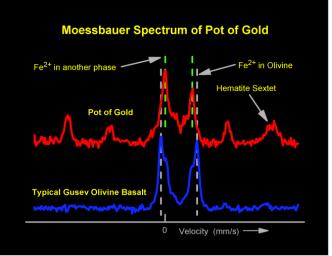Spirit, Too, Finds Hematite
Caption:
These graphs, or spectra, shows evidence for the mineral hematite in the rock dubbed "Pot of Gold," located at Gusev Crater. The data was taken from the surface of the rock with the Mars Exploration Rover Spirit's Moessbauer spectrometer on sols 161 and 163 (June 16 and 18, 2004). The top red line is the spectrum for Pot of Gold, and the bottom blue line is for a typical basaltic, or volcanic, rock in Gusev Crater. The two large peaks in the center represent non-hematite, iron-containing minerals, while the smaller set of six peaks (two are hidden in the larger peaks) in the top spectrum is the signature of hematite. Hematite, which is found on Earth, can be formed in three different ways: in standing water; in small amounts of hot fluids (hydrothermal processes); and in volcanic rock. Scientists are planning further observations of this and other rocks in the area, which they hope will yield more insight into the hematite's origins.
Cataloging Keywords:
| Name |
Value |
Additional Values |
| Target |
Mars |
|
| System |
|
|
| Target Type |
Planet |
|
| Mission |
Mars Exploration Rover (MER) |
|
| Instrument Host |
Spirit (MER-A) |
|
| Host Type |
Rover |
|
| Instrument |
Moessbauer Spectrometer (MB) |
|
| Detector |
|
|
| Extra Keywords |
Color, Crater, Thermal, Volcano, Water |
| Acquisition Date |
|
| Release Date |
2004-06-25 |
| Date in Caption |
|
|
| Image Credit |
NASA/JPL/Cornell/University of Mainz |
| Source |
photojournal.jpl.nasa.gov/catalog/PIA06314 |
| Identifier |
PIA06314 |

